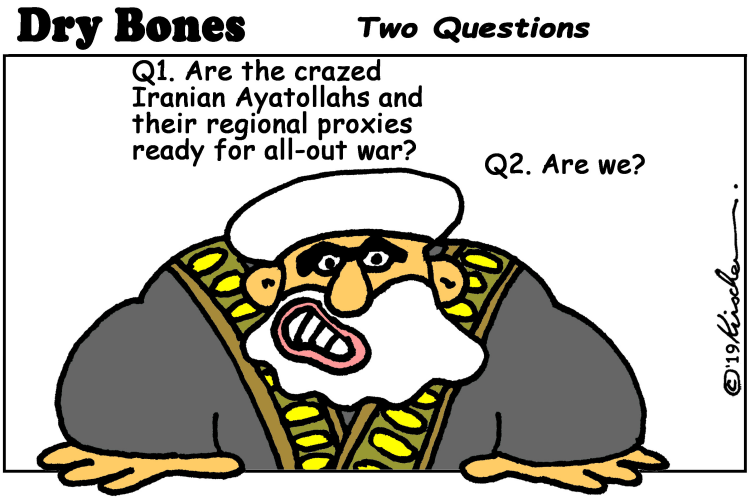Area C: ‘Occupation’ or annexation
Ironically, withdrawal of Israeli control would condemn Arab Palestinians to Hamas control and promote violent power struggles between warring Muslim factions. This chaotic situation would enable other countries and Islamic militants in the region to join the conflict and would likely destabilize the entire region. In addition, it would further Syrian aspirations to recover the Golan Heights, and encourage Islamic militants – such as ISIS, al-Qaeda and Hezbollah – to continue attacking Israel.Noah Rothman: What It Will Take to Prevent Iran from Starting a War
This scenario is the danger of the “two-state-solution” (TSS). The TSS would not resolve any Arab and Palestinian objections to Israel’s existence as declared in the PLO Covenant and Hamas Charter; it would neither change their fundamental narrative of the Nakba, and the “Right-of-Return” for Arab “refugees,” nor their demand that Israel return to the UN-proposed plan of 1947. The TSS means, therefore, ending Israel’s existence.
On the other hand, declaring Israeli sovereignty over Area C – annexation – would confirm and protect the right of Jews to live in their homeland and it would promote a constructive, productive future for all residents of the area. It would eliminate the “military occupation” by the IDF/COGAT. It would allow Israel’s security forces to apprehend terrorists in PA towns and cities. It would strengthen Israel’s security and would enable Arabs in the area to live in peace and enjoy economic and social benefits.
Opposing annexation, however, does not and will not prevent Israel’s enemies from denouncing “the occupation” and engaging in anti-Israel activities. And, the issue of “settlements” continues to fracture Israeli society and diminish our national cohesion. It’s a “lose-lose” strategy.
Although Israeli leftists oppose annexation, they offer no reasonable or practical alternative. Moreover, they are oblivious to the consequences of not annexing Area C. Opposing the implementation of civilian Israeli authority (annexation) and continuing the “military occupation” of Area C, therefore, serves no one; it makes no sense.
Israeli leftists have a responsibility and obligation to explain how their plan would work. Refusing to do so means that they are not serious and don’t care about the damage they cause. Do they stand with Israel and Zionism, or not? Are they with us, or against us (meaning the vast majority of Jews in Israel)? Jewish communities in Area C are facts of life. Abandoning them is not an option. The choice, therefore, is simple: Annexation or “Occupation” – sovereignty or self-defeat.
So, if the response to Iranian aggression is not unconditional diplomatic re-engagement, what should it be? The Trump administration remains committed to an admirable and arguably successful effort to use financial and diplomatic tools to destabilize the Iranian regime from within. But that commitment forecloses on retaliatory strikes on Iranian targets. Such a course would provide the regime with the opportunity to rally the public against the United States, shifting the nation’s focus away from the regime’s failures and toward an exogenous threat.
The White House’s reluctance to undermine that strategy and the president’s desire to avoid “disproportionate” loss of life or collateral destruction is commendable but flawed. The Iranian regime is not interested in proportionality. Its interests lie in fomenting conflict in the region, breaking the resolve of America’s European allies to maintain a united front, and ultimately relieving the economic pressure on the regime.
The timing of this latest attack affords the Trump administration an opportunity to turn the tables against the Iranian regime. As the world’s leaders gather in New York City ahead of the 74th session of the United Nations General Assembly, the Trump administration should use that platform to make the case against the Iranian regime. It should reveal the intelligence its officials claim to have proving why Iran was behind this act of war. It should expand upon its theory of the case: That Iran’s provocations are part of a deliberate effort to destabilize the region, sow tension within the Western alliance, and divide and conquer. It should compel the civilized nations of the world to deploy naval assets to the region to deter further acts of Iranian piracy, which have not abated even in the wake of the strikes in Abqaiq. And finally, the Trump administration should reserve the right to use incommensurate retaliatory force against Iranian regime targets with or without the support of its allies.
The Trump administration should do all these things, but it won’t. Iran will continue to test its freedom of action until it miscalculates and ignites an international incident that necessitates an immediate military response to reestablish what the Trump administration confessed broke down long ago: deterrence. We can only hope that the damage that will be done and the lives that will be lost in that event will be minimal. But there can be no question that, on the present course, it is coming. (h/t IsaacStorm)
US to Attempt ‘George Costanza Doctrine’ in the Middle East (satire)
Noting that every action the US has taken in the Middle East for roughly seven decades has been wrong, Secretary of State Mike Pompeo has adopted the ‘George Costanza Doctrine’ of doing the opposite of policymakers’ instincts.
“Every decision we have made – who to bomb, where to invade, who to ally with – has gone disastrously wrong,” Pompeo explained. “We counted on the Shah of Iran to stay in power, we threw our weight behind the Oslo Peace Process, we invaded Iraq, we bombed Libya, we stayed out of Syria – and nothing has worked out since oil was discovered in the Arabian Peninsula.”
Pompeo continued, “If our instincts are always wrong, then the best way to achieve our desired outcomes may be to do the opposite of what we think is correct.”
So far, the new approach has led to some policy successes. When Israel revealed plans for a new round of settlement construction, the US announced its support and added that it would soon be building settlements for American Zionist Christians in the Jerusalem suburbs. President Trump then announced that he would respond to the humanitarian crisis in Syria by opening the door for an influx of Syrian refugees and by banning non-Muslims from immigrating into the US.
And when a caravan of Middle Eastern men in Humvees were spotted near the Afghanistan-Pakistan border, the military decided against taking them out with a Predator drone. This move also paid off – though the men turned out to be terrorists, they soon blew themselves up when an explosive device planned to be used in a suicide bombing exploded prematurely.
“Crooked Hillary and Obama the Communist Kenyan never thought of this opposite stuff!” Trump considered tweeting, before thinking better of it and logging off Twitter.


















































.jpg)




